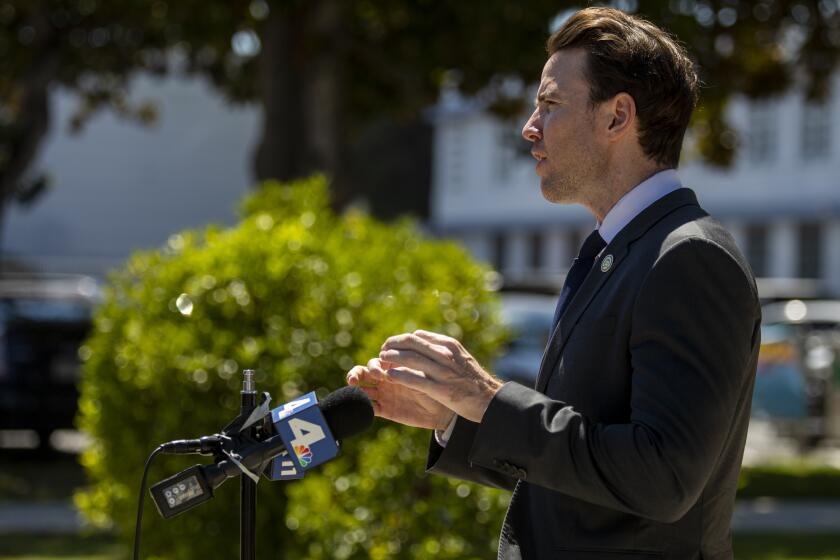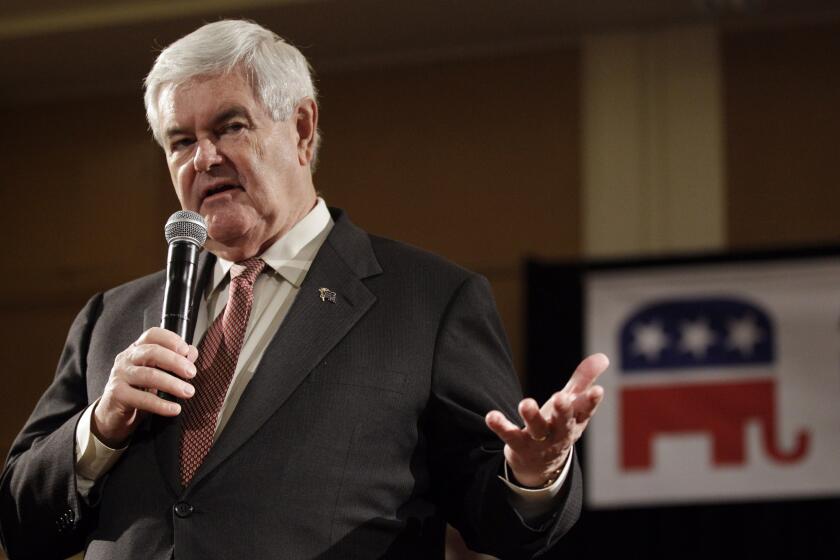Criminal justice reform is alive. Thank conservatives

- Share via
Congress eliminated parole from the federal criminal justice system in 1984, but it didn’t completely do away with post-release supervision. About 3 of every 4 people leaving federal prison remain under supervision, often for years, and often for no good reason.
A transition period to ensure successful reentry into society after prison makes sense. But federal supervised release — a parole-like period of restrictions post-prison — lasts too long and is too expensive. It makes little distinction between those who are at high risk to break the law again and those at negligible risk. And there is mounting evidence that the longer supervision goes on, the greater the chance that the former prisoner will get into trouble again. The extended lack of real freedom interrupts transition to responsible post-prison behavior.
Editorial: Time to defend California’s hard-won criminal justice reforms from lawmakers. Again
Public safety challenges are being improperly used to roll back criminal justice reforms. The next generation of leaders must show wisdom and backbone.
The Safer Supervision Act is a bipartisan bill that would shorten post-prison supervision upon a showing that public safety would not be negatively affected.
It is similar in spirit to the First Step Act, another bipartisan federal criminal justice reform that was signed into law in 2018 by President Trump. The act reduced excessive federal prison sentences while encouraging rehabilitation. It was one of the few truly bipartisan successes in years, a result of efforts by CNN commentator Van Jones and U.S. Sen. Cory Booker, a Democrat from New Jersey.
And, importantly, reform-oriented Republicans.
The exonerations of Jofama Coleman, Abel Soto and others should remind us of the dangers of elevating fear and vengeance over justice.
Liberals could too easily mislead themselves into believing that tough-on-crime conservative lawmakers signed on to the First Step Act six years ago and are signing on to the Safer Supervision Act now as reform newbies. That’s a far cry from the truth.
Criminal justice reform has deep roots in political conservatism. Some of the most meaningful recent sentencing reforms have come from states like Texas, Georgia and South Carolina. The organization Right on Crime and other conservative reform groups draw on religious traditions that stress repentance and forgiveness, plus a deep concern over government expansion and waste — including in public safety and punishment.
Like the American dream, the California dream of fresh starts and fair play is undermined by rules that protect privilege and punish poverty.
Writing in favor of the Safer Supervision Act, former House Speaker Newt Gingrich, a Georgia Republican, emphasized the conservative critique of an expansive carceral system.
“Our nation’s public safety systems are not immune from the bloat, waste, and ineffectiveness that naturally grows in massive government operations,” Gingrich wrote.
Three bills to roll back or repeal Proposition 47 are grounded in fear and falsehoods and should be rejected.
You don’t have to be a fan of Gingrich or his politics to appreciate his support for badly needed changes in a criminal justice system with far too large a footprint and too little benefit to show for it.
A decade ago, Gingrich joined with the late Malibu billionaire B. Wayne Hughes Jr., in writing a Times op-ed in favor of Proposition 47, the California reform that right-sizes drug offenses and small property crimes. Hughes, a staunch conservative, founded and ran an organization that assisted crime victims and former offenders. He was one of the biggest donors to the Proposition 47 campaign.
Imagine you have the power to decide the fate of someone addicted to heroin who is convicted of petty shoplifting.
The two noted that Texas reversed prison expansion in 2007, saved billions of dollars and used the savings on drug treatment and mental health services. Texas reset the dividing line between misdemeanor and felony theft at $2,500 (California’s is $950 — well short of Texas levels).
Ohio, Oklahoma, Kentucky, Missouri and Mississippi — all red states, Gingrich and Hughes noted — adopted their own reforms along the lines of Texas’.
Prison reform the conservative way
“Now voters in California will have a chance to do the same, using costly prison beds for dangerous and hardened criminals,” Gingrich and Hughes wrote. “It is time to stop wasting taxpayer dollars on locking up low-level offenders.”
Today’s election-year posturing has clouded the facts and original politics of criminal justice reform. Some elected Democrats, fearing for their political lives, embrace false connections between smart reforms and periodic spikes in crime. Some elected Republicans — especially in California — betray the conservative reform principles articulated by Gingrich, U.S. Sen. Rand Paul (R-Kentucky) and others to seek backing from law enforcement and other groups that see political gain in embracing fear.
States don’t get any bluer than California, so last November’s vote adopting Proposition 47 – reducing six felonies to misdemeanors – could easily be taken as evidence that liberals and Democrats are leading the nationwide de-incarceration movement.
But even law enforcement organizations such as the Major Cities Chiefs Assn. have joined with prosecutors, defense lawyers, religious groups and progressive reformers to embrace the Safer Supervision Act.
Truth be told, the reform doesn’t go far enough. But that’s no reason to reject it. The First Step Act made it clear by its name that more reform steps were needed. But they are to be taken one at a time, as conservatives and liberals, Democrats and Republicans, seek common ground. Passing the Safer Supervision Act is a step that Congress ought to take now.
More to Read
A cure for the common opinion
Get thought-provoking perspectives with our weekly newsletter.
You may occasionally receive promotional content from the Los Angeles Times.














